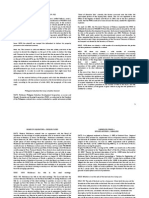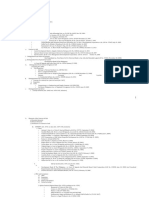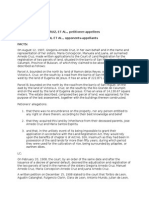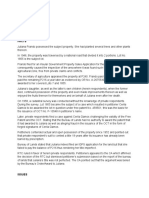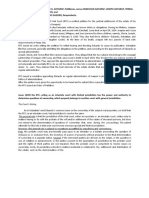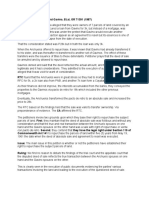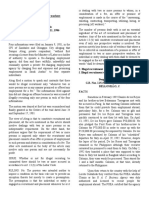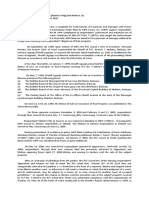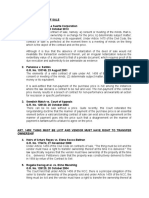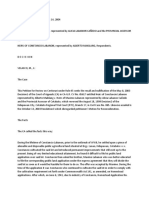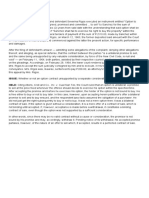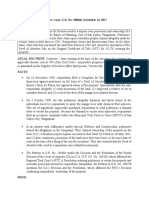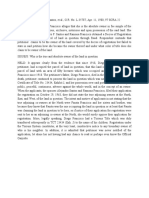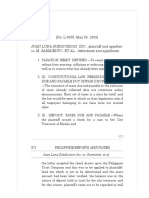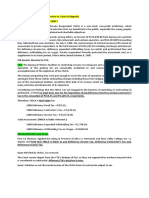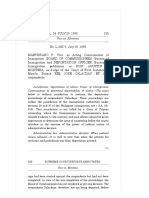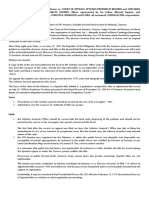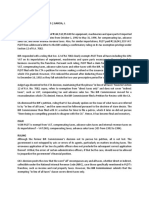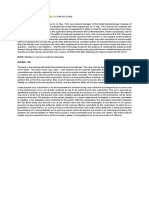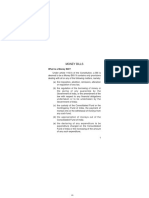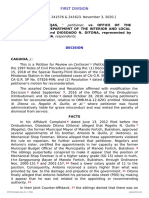GENEROSA AVILES and her husband RUFINO VILLAFUERTE, plaintiffs-appellants, vs.
SEGUNDA ARCEGA
and FORTUNATO DE LEON, defendants-appellees.
1922-09-18 | G.R. No. 18341
The house in question belong originally to the spouses Vinancio Alcantara and Vicenta Capulong. On the
10th of October, 1917, these spouse sold this house in a public document to Generosa Aviles, the herein
plaintiff, it having been stipulated, the document executed for the purpose, that "during four months from
the 10th of October, 1917, the vendors would continue in possession of the house
That in a document dated March 13, 1918, and acknowledged on the following day before Ariston Rivera,
notary public, the same property was sold by the same spouses Venancio Alcantara and Vicenta Capulong
for P500 to the spouses Fortunato de Leon and Segunda Arcega, who took possession of the property, as
stated in the thirds paragraph of the complaint, the plaintiff Generosa Aviles never having taken
possession thereof
None of two sales appears to have been registered (not registered sa registry of deeds, pero may public
document)
Trial court rendered judgement declaring the defendants to be the owners of the house and absolving
them from the complaint with costs
Issue:
w/n there is a symbolic delivery which would in effect entitle Aviles to the title of the property
Held:
No symbolic delivery. Defendants acquired the title to the property.
The plaintiff cannot invoke symbolic delivery by the execution of the public document of sale, inasmuch
as there was not, nor could there have been, such delivery, the same being prevented by the express
stipulation contained in the deed of sale, to the effect that he vendors did not part with the possession of
the house but would continue therein for four months. Article 1462 of the Civil Code says:
"If the sale should be made by means of a public instrument, the execution thereof shall be equivalent to
the delivery of the thing which is the subject-matter of the contrary unless the contrary appears or may
by clearly inferred from such instrument.
It cannot be said that symbolic delivery spontaneously took after the lapse of the four months stipulated,
for there is no law providing that it should take place after the execution of the document where there is
a stipulation to the contrary.
The law does not say that such a symbolic delivery is suspended when att he execution of the document
a stipulation to the contrary is made. What the law simply says is that no such symbolic tradition can take
place, - can exist - when there is a stipulation to the contrary.
There was no symbolic delivery because there was an express stipulation to the contrary. It cannot be said
that after the lapse of the four months following, during which the vendors were to continue in possession
of the house, according to the stipulation, any symbolic delivery subsisted. Nothing can subsist that did
not exist before.
if it appears therein, or can be inferred therefrom, that it was not the intention of the parties to make
delivery, no tradition can be deemed to have taken place. Such would be the case, for instance, where a
certain date is fixed when the purchaser should take possession of the thing, or where in the case of last
installment is made, the title to the property should not be deemed to have been transmitted.
Neither can it be said that the house must be presumed to have been delivered tot he first purchaser after
the lapse of the four month aforesaid, for such a presumption is overthrown by the fact stipulated by the
parties that this first purchaser never took possession of the house.
�Under the Civil code, the conclusion is inevitable that eh title to the house was transmitted no to the
plaintiff but to the defendants since the plaintiff, never took possession of the house, while the second
purchasers, the defendant spouses, did.
The vendors were in possession of the house before, and at the time of its conveyance, and continued
thereafter in said possession. It is further, to be noted that he plaintiff never had possession of the house,
as stated at the end of the second paragraph of the stipulation of facts. It thus being admitted by the
appellants that the purchaser Generosa Aviles, one of the plaintiff, never had possession of this house, it
cannot be presumed that she took possession thereof at the expiration of the four months following the
sale, as stipulated by the parties. Such positive fact having been expressly admitted, there can be no
presumption to the contrary.
Dissenting: ARAULLO, C.J., MALCOLM, AVANCENA, and VILLAMOR,JJ.,
The majority opinion says: "At the time, therefore, of the execution of the deed in favor of the plaintiff
the first purchaser, there was no symbolic delivery because there was an express stipulation to the
contrary. It cannot be said that after the lapse of the four months following, during which the vendors
were to continue in possession of the house, according to the stipulation, any symbolic delivery subsisted.
Nothing can subsist that did not exist before."
This reasoning , in our opinion, is applicable only where the stipulation inserted in the public documents
involves a resolutory condition. But to our mind the stipulation under consideration constitutes a
suspensive condition. The essential difference in law between these two kinds of condition is that
fulfillment of the suspensive condition makes the obligation effective, whereas that of the resolutory
resolves the obligation - makes it entirely ineffective.
The symbolic tradition, which is effected by the execution of the public document, was suspended for four
months by virtue of the stipulation. It cannot be said that it did not exist because suspension presupposes
the existence of that which is suspended. The four months elapsed, the condition was fulfilled. It seems
clear to us that the symbolic tradition, which was temporarily suspended, recovered its efficaciousness,
as a necessary consequence of the execution of the public document. To hold other wise is to give the
stipulation a meaning contrary to the evident intention of the contracting parties.
The doctrine we maintain finds support in the very opinion of the authoritative commentator of the Civil
Code, Mr. Manresa. "This kind of tradition, however, is as to its efficaciousness, subject to the terms of
the document, for if it appears therein or can be inferred therefrom that it was not the intention of the
parties to make delivery, no tradition can be deemed to have take place. Such would be the case, for
instance, where a certain date is fixed when the purchaser should take possession of the thing, or where
in the case of sale by installments, it is made, the title to the property should not be deemed to have been
transmitted, or where the vendor reserves the right to use and enjoy the property until the gathering of
the pending crops."
Manresa does not say that, at the expiration of the term fixed, or upon the payment of the last installment,
in the examples given by him, the public document ceases to produce legal effect - the symbolic tradition.
Neither can it be said in the case at bar that the lapse of the term stipulated renders the document
ineffective in so far as the effecting of tradition by its execution is concerned, be cause this would amount
to annulling an obligation by the fulfillment of a suspensive condition.
